Citizenship sales, land creation and legal battles: How small islands are confronting existential climate threat
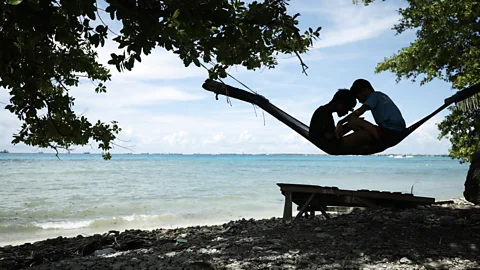 Getty Images
Getty ImagesFrom erecting seawalls to selling citizenship, vulnerable small islands are taking sometimes drastic measures to protect themselves from rising seas, storms and economic devastation.
For decades now, scientists have been warning that without action to combat emissions, some low-lying islands will literally disappear beneath the waves. Many others will become uninhabitable as extreme weather increasingly batters their coastlines.
As the world edges closer to a long-term average of 1.5C warming, these warnings are becoming a seriously imminent prospect for some island nations. Five islets in the Solomon Islands, a nation of hundreds of islands in the South Pacific, have already been completely lost to sea level rise. And many small island developing states are seeing substantial annual economic losses due to coastal floods. By 2050, coastal flooding is set to triple across these nations, increasing annual economic damages by nine to 11 times.
Small islands have become a strong voice in international forums, pushing for more ambitious climate policies to curb global temperature rise, and were key to the 2015 Paris Agreement to pursue efforts to limit temperature rise to 1.5C. But they are increasingly facing some stark choices about how to physically stay above the waves, as well as in their diplomatic pushes for money to weather an increasingly uncertain climate.
Speaking at the closing plenary of COP29 in Baku, Azerbaijan, Toeolesulusulu Cedric Schuster, the Samoan chair of the Alliance of Small Island States (Aosis), told delegates that "time is not on our side" and urged them to implement ambitious climate plans. "[We] cannot do this alone," he said, adding that small islands required "transformational change" in access to climate finance. (Read more about the trillion-dollar climate puzzle that's become a diplomatic nightmare).
From reclaiming land from the sea to selling citizenship, the BBC looks at some of the measures already being taken to save these low-lying nations.
Make more land
With sea-levels rising, one obvious response is to create new land. This has been the approach of the Maldives, a low-lying 1,200-island archipelago some 400 miles (644km) south of India.
The Maldives has the lowest terrain of any country in the world, and studies have concluded flooding here could eventually become too high for it to sustain habitation, leading to inevitable migration away from the islands. In a bid to protect itself, support a growing population and develop its economy, the Maldives has for decades now been working on a huge project of land reclamation. According to one paper, at least 186 of its 1,149 islands have some reclaimed land. More projects are on the way.
Land reclamation consists of dredging up sediment from the ocean floor to extend coastlines. But there has been concern from scientists, locals and human rights groups about the environmental and social impacts of the practice. Land reclamation can be harmful for natural coastal ecosystems such as coral reefs and mangroves, themselves hugely important for the coastal resilience of low lying islands. Natural shorelines are transitioning to artificial ones, resulting in even greater coastal erosion.
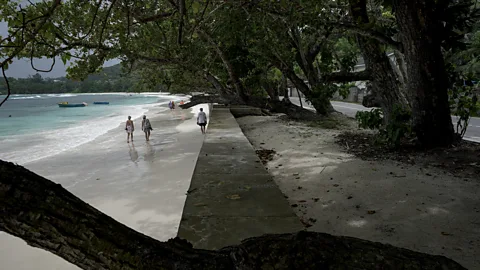 Getty Images
Getty ImagesWith these natural protections destroyed or undermined, flooding risk can go up. According to one paper, most of the inhabited islands in the Maldives now exhibit an "altered-to-annihilated capacity to respond to ocean-climate pressures". A 2023 paper found that land reclamations in the Maldives "lack a systematic approach" to anticipate sea-level rise and fail to account for local flood risk in their design and location choices.
The UN's climate body, the IPCC, has warned that land reclamation can become "a vicious cycle" for islands. By degrading ecosystems such as reefs and mangroves, land reclamation can compromise the protection they offer to island communities, and thus actually increase their exposure and vulnerability, according to the IPCC.
Responding to these concerns, Ali Shareef, the Maldives' special envoy for climate change, told the BBC that with 99% of the country's territory being ocean, land scarcity remains among its most pressing challenges. "As such, reclamation has become a necessary strategy to cater the needs of our growing population and to create new economic opportunities," he says. "However, we have regulations in place to minimise the impacts and damages."
Shareef adds that in recent years the Maldives has placed "a strong emphasis" on nature-based solutions, including mangrove and coral reef restoration, as well as attempting to minimise the impacts of construction on shorelines.
However, he acknowledges that there are still knowledge gaps. "We recognise the critical importance of balancing development with environmental sustainability," he says. "This has led us to integrate climate resilience and ecosystem protection into our reclamation projects. A key example is the Ras Malé eco-city, designed to be raised 3m (10ft) above sea level and powered entirely by renewable energy."
Sea defences
The most common measure used on islands to protect coasts, however, are seawalls. These promise a dual benefit of preventing soil sliding away (coastal erosion) and protecting the shoreline from waves and flooding.
However, poorly constructed seawalls can collapse: on Indian Ocean islands such as Seychelles, the shorelines are "littered with broken seawalls and groynes", according to the IPPC (groynes are protective structures which lie perpendicular to the shore). Seawalls can shift problems of shoreline erosion and lowland inundation elsewhere: in one case, a seawall erected to protect a village in Samoa was not long enough to protect all the houses, leading some families to face increasing impacts from large waves.
Nature-based defences, such as restoring mangroves, coral reefs and seagrass meadows which can protect people from coastal flooding and storms, are also becoming a priority for many small islands. Other ways of weathering disasters are also getting higher interest, such as improving weather monitoring and early warning systems, or strengthening infrastructure to better weather extreme weather.
Selling citizenship
All this takes money, however, and where to get the rising amounts needed for such protection is not an easy challenge. Nor is sea-level rise the only climate threat to low-lying island nations. The highly disaster-vulnerable Caribbean island of Dominica is one country with an unusual, and potentially risky, strategy here.
Back in September 2017, shortly after Dominica was hit by the rapidly intensifying, category five Hurricane Maria which cost it some $1.3bn (£1bn), or 226% of its GDP, the country pledged to become "the world's first climate-resilient" nation.
"Our devastation is so complete that our recovery has to be total," prime minister Roosevelt Skerrit told the UN General Assembly at the time. The situation, he said, presented a unique, if unchosen, opportunity to be an example to the world of how "an entire nation rebounds from disaster" and "can be climate resilient for the future".
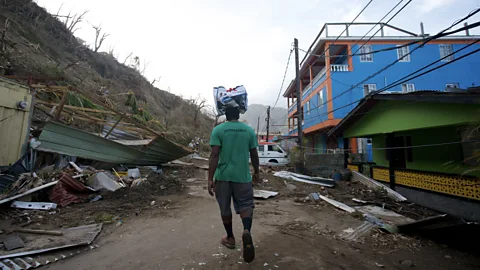 Getty Images
Getty ImagesDominica quickly drew up a plan to improve its climate resilience and better manage future disaster response. The country focused on developing its infrastructure for monitoring weather and water and early warning systems for disasters. It installed huge tankers to supply clean water in case of another hurricane or drought. It also rebuilt its seismic monitoring network, destroyed during Hurricane Maria: an essential step for one of the most seismically and volcanically active islands in the Caribbean. A landslide-prone country, it began planting more native plants and building other infrastructure to help stabilise slopes.
The unusual part, though, is the source of cash it is using to fund much of this: selling citizenship. Dominica has been selling passports – including to people who have never set foot on Dominica – since the 1990s. After recently doubling the price, it now costs $200,000 (£160,000), via a donation to its Economic Development Fund, or a real estate investment. The programme has ballooned in recent years, with revenues reaching 25-30% of its entire GDP.
Not all this money is going into resilience, and Dominica has other sources of funds too, but the long-term viability of relying on the passport income as a strategy to increase resilience against climate change is not assured. Concern is growing internationally around such citizenship schemes, which promote visa-free travel to a number of countries as one of the main benefits to customers. In 2023, the UK withdrew visa-free travel for citizens of Dominica over security concerns about citizenship being granted to people who posed a risk to the UK. A 2023 EU Commission report concluded Dominica had issued far more passports than officially stated. The EU commission raised security concerns about the trade, proposing a suspension in its visa-free regime for countries selling citizenship.
A 2024 report from the International Monetary Fund (IMF) on Dominica noted that recent international scrutiny of citizenship-by-investment schemes "threatens the viability" of financial flows for post-disaster reconstruction and development.
The government of Dominica did not respond to a request for comment.
Climate cash
So where else can these small developing island countries get the money needed to fight climate impacts?
Climate-vulnerable nations have long been pushing for more access to money from historically large economies to help them reduce emissions and deal with the impacts of climate change. Such climate finance, delivered via grants and low-interest loans, has become a key tenet of climate justice for impacted countries less responsible for global emissions. It currently amounts to just over $100bn (£79.8bn) per year.
Many island states are becoming increasingly frustrated with slow progress at UN climate talks, especially when it comes to delivering money to support countries vulnerable to climate impacts.
A key focus for COP29 was for countries to agree on a promised new target for climate finance going forwards, with many developing countries pushing for at least $1.3tn (£1.03tn) and small island states pushing for $39bn (£31bn) within this specifically for them. In the final hours of the conference, Aosis temporarily walked out of the finance talks. Speaking just after COP29 concluded in late November 2024, Michai Roberts, lead negotiator on finance for Aosis, told the BBC that other countries were "laughing at them" for asking for larger sums of money to help them tackle climate change. "The size of the damage to our economies [from climate change] outweighs any sort of per capita calculation of how much money we're getting," he said, adding that Aosis has always been "pragmatic" in the UN talks.
The final agreement landed on $300bn (£238bn) a year, less than a quarter of the suggested, more ambitious target.
In a statement, Marshall Islands climate envoy Tina Stege said the conference had seen "the very worst of political opportunism". "We are leaving with a small portion of the funding climate-vulnerable countries urgently need," she said. "It isn't nearly enough, but it's a start."
In August 2024, Papua New Guinea’s prime minister James Marape announced the country was pulling out of COP29 as a "protest at the big nations" with large carbon footprints for their "lack of support" to climate victims and forest and ocean nations.
Along with the Indonesian provinces of Papua and West Irian Jaya, Papua New Guinea is home to the world's third largest rainforest, the biggest in Asia. It's also highly vulnerable to climate change, with a dispersed population highly reliant on subsistence farming and susceptible to climate-induced natural disasters such as extreme weather, storm surges, sea-level rise and coastal inundation.
"Our economy needs money yet we are preserving trees as the lungs of the Earth, whilst industrialised nations keep on emitting," Marape said. "You have not paid for any conservation."
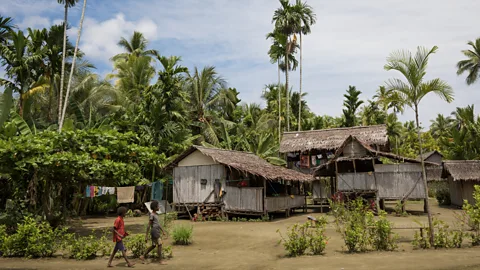 Getty Images
Getty ImagesBut climate advocates have warned a move to stop attending such talks could have the opposite effect, isolating the country from climate discussions and weakening its ability to access climate finance. And in the end, Papua New Guinea did send a delegation, although Marape did not attend. From Papua New Guinea, he urged "genuine action on preserving the world's rainforests", adding that he hopes rainforest nations will have a stronger voice at next year's COP30 in Brazil.
Other islands frustrated with the lack of movement on climate finance have been taking a different tack. Barbados prime minister Mia Mottley has become a well known name at climate talks due to her campaign to reform international finance, especially with regards to debt cancellation and restructuring, to help vulnerable countries better afford measures to cut emissions, adapt to climate change and deal with climate disasters.
At an opening speech at COP29 in Baku, Azerbaijan, in November 2024, Mottley urged delegates to loosen the "economic noose of tightening fiscal space" by delivering "urgently needed financial reforms". She called for developed countries and carbon producers to boost climate money without increasing debt in "already burdened" developing countries using global levies on stock and bond trades, shipping and fossil fuel extraction.
Rethinking debt
Barbados, a Caribbean nation of 280,000 people vulnerable to sea level rise and intensified tropical storms due to climate change, has already launched an ambitious adaptation plan to protect people and infrastructure from extreme weather. Mottley has previously warned that migration from Caribbean states will soon become a reality without emissions cuts and finance for resilience projects.
Her Bridgetown Initiative, launched in 2022, calls for a host of changes to multilateral money lenders such as the IMF and World Bank, including "natural disaster clauses" to automatically suspend debt servicing when climate disasters hit. Barbados has also joined other islands such as Belize and the Seychelles in setting up "debt-for-nature" swaps, where foreign debt is cancelled in exchange for local investments in conservation. (Read more about the deal that saved the Seychelles' troubled waters.)
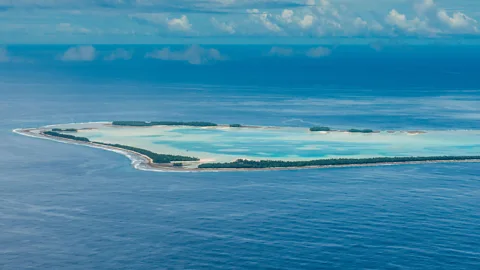 Alamy
AlamyPublic debt levels in developing countries reached $29tn (£23tn) in 2023, and has grown twice as fast as in developed countries since 2010. Small island developing states are particularly exposed: they had an average external debt of 48-51% of gross national income from 2011 and 2019, and 40% of are either highly indebted or are pushing towards debt distress, according to a report last year.
A higher frequency of climate disasters is just one reason why many are urging a rethink on how money is lent to poorer countries. And Mottley is not the only leader calling for a step change on debt when it comes to climate impacts. A joint letter signed by the prime ministers of Antigua and Barbuda, Saint Vincent and the Grenadines and Grenada in July 2024 outlined this need following the "horrific devastation wrought by Hurricane Beryl" on small island economies.
Addressed to the UK government, the letter called for immediate debt cancellation in all three countries and a "Marshall Plan" for small island states, in reference to the US programme of support to postwar Europe in the late 1940s.
"Many small islands are struggling with insupportable debt burdens caused not by fiscal profligacy, but the elevated cost of repeated rebuilding after intensifying climate-related shocks for which they bear no responsibility," the letter read.
"Rich and big countries are largely responsible for accumulated emissions, and most able to evade their debilitating consequences. So they owe it to small islands to drastically change this palpably unfair and inequitable settlement."
Legal battles
Some small island states are now taking to international courts as another avenue to push richer countries to act on emissions and deliver climate finance, including the requests for money to cover the loss and damage from climate impacts, long a topic of fierce tension at climate talks.
In 2023, Vanuatu, a Pacific nation made up of around 80 low-lying islands, won its bid for an advisory opinion from the International Court of Justice (ICJ) on the legal obligation of states to reduce their impact on the climate and wider environment. The case is set to open in early December 2024, and while the legal view will be non-binding, it could be cited in climate court cases around the world.
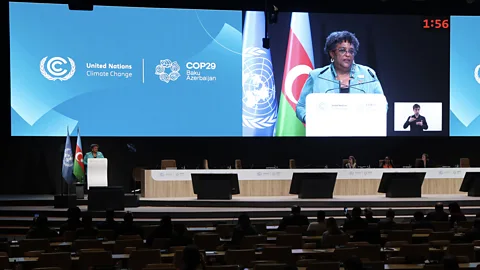 Getty Images
Getty ImagesOther court rulings brought about by islands have already been given. In September 2022, eight Torres Strait Islander people won a legal action against Australia at the UN's Human Rights Committee for climate-induced damages to their ancestral lands. It was the first legal action brought, and won, by climate-vulnerable inhabitants of low-lying islands against a nation state.
And in a May 2024 advisory opinion, the International Tribunal for the Law of the Sea expanded the definition of marine pollutants to include greenhouse gases. In a ruling requested by a coalition of nine small island states led by Antigua and Barbuda and Tuvalu, the tribunal stated that countries have a legal obligation to reduce their greenhouse gas emissions due to their current legal obligations to reduce marine pollution. This advisory opinion has "no binding force", but could be cited in other domestic and international court rulings. (Read about the other legal battles changing the course of climate change.)
Facing loss
Some islands are acknowledging, though, that there are some places that no amount of money will be able to save. In Fiji, an archipelago of more than 300 islands where dozens of coastal villages may soon be underwater, for example, the government has begun a careful village relocation programme. One local community has mandated that young adults building their family home should do so up-slope from the existing village, which is regularly flooded, to allow it to slowly transition away from danger.
Other nations are planning for relocation outside their historic islands. Tuvalu, an atoll nation of nine coral islands in the Pacific Ocean, is already facing the fact that, within decades, much of its land mass may no longer lie above sea level. Yearly damages due to flooding by the end of the century could amount to over 70% of its GDP, one paper found. Confronting the possibility of disappearing as a nation altogether, its leaders have decided to build the world’s first digital copy of a country, backing up everything from its houses to its beaches to its trees. (Read more about Tuvalu's race to upload itself to the metaverse).
As its citizens leave the island, Tuvalu hopes that the project could help to preserve its sovereignty. It has even enshrined a new definition of statehood in its own constitution, which is being increasingly recognised by other countries.
At a high level UN meeting in September 2024, small-island states issued a joint declaration affirming their right to retain statehood, sovereignty and UN membership, regardless of the course of sea level rise. Fiame Naomi Mata'afa, prime minister of Samoa and chair of Aosis, said in a release that island states have "stayed firm" for over 20 years and that "our states, maritime zones, and rights remain intact under international law, no matter the rising seas: we are here to stay".
There may always be a way to keep something of the islands set to be lost to climate change. But few are ready to give up the fight for their territories to remain as real, liveable islands for their citizens.
--
For essential climate news and hopeful developments to your inbox, sign up to the Future Earth newsletter, while The Essential List delivers a handpicked selection of features and insights twice a week.
